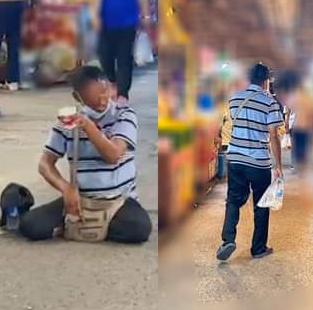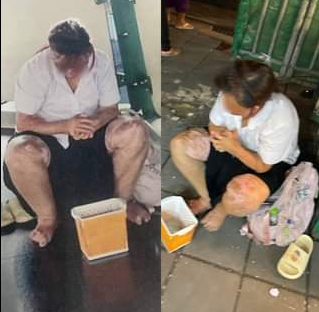Chinese Beggars in Thailand: No Trafficking, Just Lucrative Earnings
You might have read in the recent news that Malaysians are flocking to Singapore for a better career future since the appreciation of SGD.
Yes, indeed one can earn pretty well in Singapore given the hard work.
But there is one job that might possibly just earn more than any Singaporean job.
And that is none other than begging on the streets in Thailand.
According to Bangkok Post, each beggar earns up to 10,000 Thai Baht (S$380) a day.
That means in an ideal situation, a beggar can earn more than S$10,000 in a month if they work for 28 days in a month. Wow.
A Thai social media influencer, Kanthat Pongpaiboonwej, shared that this estimation only includes those who have been found, and the actual figure may be higher.
A total of 7,158 beggars were integrated into the system between October 2014 and October this year, according to the Ministry of Social Development and Human Security in Thailand.

Among that total, 4,685 were Thai nationals and 2,473 were foreigners.
And most recently, we see Chinese beggars on the rise in Thailand.
Most of these beggars have similar conditions, whereby their wounds on the body are visible and have some sort of facial disfigurement akin to acid burn and mutilation on limbs.

Begging Is Illegal
However, begging is illegal in Thailand according to The Control of Begging Act B.E. 2559 (A.D. 2016).
Any of the following acts are deemed to be begging: a) to beg for money for property from others for a living, whether it is carried out orally or by any statement or gesture; or b) any act done by any means whatsoever to induce another person’s compassion and delivery of money or property.
Any person who violates this section is liable to be punished by imprisonment of up to one month or a fine of up to 10,000 Baht, or both.
The minimum age of criminal responsibility in Thailand is ten years old under the Criminal Code.
Most recently on 20 Nov, a Chinese woman who appeared to have been severely physically abused has been arrested for begging in front of a shopping mall in the Pinklao area in Bangkok.
Minister of Social Development and Human Security, Varawut Silpa-archa ordered an investigation into the case of the Chinese woman.
Reportedly, the woman had a scarred face and was missing two fingers, and was dressed as a student while begging.
Initially, authorities believe that the woman was a victim of human trafficking, as a check of her bank account revealed 2 million baht (S$76,000) was moving through the account every month.
Not only so, when the police caught her in the restroom, they discovered a significant amount of money, around 10,000 baht, in her bag, which is suspected to have been obtained through begging. However, no passport was found.
However, soon six Chinese nationals with severe deformities caught begging on the streets of Bangkok were found out to not be victims of torture, physical abuse or coercion by human traffickers as believed earlier.

In fact, on 27 Nov, the detainees admitted to entering Thailand voluntarily, after learning begging in the capital could earn them up to 10,000 baht (S$380) a day, according to immigration bureau chief lieutenant-general Ittipol Ittisarnronnachai.
And additionally, a common trait amongst all the detainees were that they all have had experiences begging in Singapore and Malaysia, mostly getting their earnings from tourists (sounds familiar?)
FYI, begging in the streets is illegal in Singapore.
Any person being a habitual beggar found begging in a public place can be convicted to a fine not exceeding $3,000 or to imprisonment for a term not exceeding 2 years.
Then what about the tissue paper sellers?
The Street Hawking Scheme is a licensing mechanism put in place by the National Environment Agency (NEA) for tissue paper sellers.
It provides an annual licence for a $120 fee to these sellers, allowing them to sell their products at fixed locations.
More Insights Into The Arrested Beggars
Here is a list of arrested Chinese beggars in order of when they were arrested (all names are aliases):
- Kheng, 41, apprehended on 11 Nov at the BTS Skywalk in front of the Siam Square shopping mall
- Wu, 34, arrested by Phya Thai police on a pedestrian flyover in front of the Platinum shopping mall on Phetchaburi Roa
- Yuan, 39, detained by Bang Phlat police on Nov 19 in front of the Central Pinklao shopping mall in Bangkok Noi district
- Awu (husband of Yuan), failed to flee the country when wife got arrested, and due to cancellation of visa, he was nabbed at the Cambodian border checkpoint in Sa Kaew’s Aranyaprathet district
- Hu, 28, apprehended by Thung Maha Mek police officers on 20 Nov at the BTS Sala Daeng station in Bangkok’s Bang Rak district
- Fan, 28, arrested by Lumpini police on 20 Nov at the BTS Asoke station in Thawi Watthana district
- Wang, 33, arrested by Bang Rak police on 20 Nov
The reason behind why they started begging are of all sorts and kinds.
Some did not know that begging was legal, some were honest and confessed that they heard you can earn a lot through begging in Thailand.
Some were tourists and ran out of funds for their Thailand trip.
But one thing is clear: none of them had been subjected to torture, abuse, or any kinds of human trafficking acts.
Even for the Thai women who acted as interpreters for the arrested beggars, Lieutenant-General Ittipol Ittisarnronnachai said they were not associated with any criminal gangs, according to The Straits Times.
He also said that the Chinese beggars had entered Thailand using their passports, which recorded their scars and deformities, and so the injuries were not new.
Regardless for the reason they claimed to be in Thailand for, the immigration chief noted that some of the detainees knew one other and had come together to beg.




